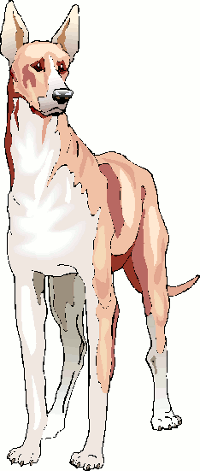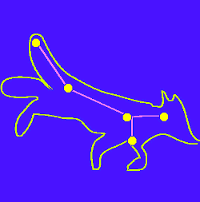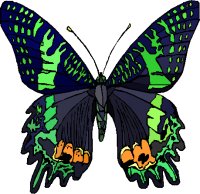Categories: "Animals"
Псина
Y'know, you just never stop learning when you study a foreign language, and last month for the first time I encountered the word псина. The primary meaning of the word is dog meat:
| В 1984-ом году в Корее запретили продажу псины. | The sale of dog meat was prohibited in Korea in 1984. |
| В Вьетнаме суп варят из псины. | In Vietnam they make soup out of dog meat. |
The word is also commonly used to just mean dog as well. If you search for псина on youtube.com, you will find all sorts of videos of people and their dogs doing all sorts of odd tricks, like singing to Gwen Stefani tunes.
Псина also means the smell of a dog or of dog fur:
| Почему здесь пахнет псиной? | Why does it smell like dog fur in here? |
| Фу, здесь воняет псиной! | Ugh, it reeks like a nasty ol' dog here. |
| Знаешь, я недавно нашёл прекрасные духи, которые пахнут мокрой псиной. Они меня спасли. Раньше девушки ко мне постоянно приставали, а теперь я могу появляться в общественных местах совершенно спокойно. | You know, I recently found a marvelous cologne that smells like a wet dog. It has saved me. Women used to hound me constantly, but now I can appear in public in complete peace. |
It seems like all words connected with dogs can be used as general terms of abuse, and псина is no exception, and it can be used of either men or women. If used of a man, it can have masculine gender, and if used of a woman, it has feminine gender:
| Маша, псина ты некультурная, ты опять обидела клиента! Удивлюсь, если тебя не рассчитают. | Mary, you rude idiot, you've offended a client again. I'll be surprised if they don't fire you. |
| Боря, псина ты идиотский, я сказала, чтобы ты купил два кило сахара и пачку соли, а не два кило соли и пачку сахара! | Boris, you complete idiot, I told you to buy four pounds of sugar and a packet of salt, not four pounds of salt and a packet of sugar. |
Note: see discussion of the last sample sentence in the comments section.
Дог

The Russian word дог is a false cognate: it doesn't mean dog. It means Great Dane. Although regular nominative plurals often end in -ы, here spelling rule 1 interferes so that the plural is доги. The three Russian spelling rules are:
Spelling rule 1:
After г, к, х, and ж, ч, ш, щ — never write ы, instead use и.
Spelling rule 2:
After ж, ч, ш, щ, and ц — never write an unstressed о, instead use е.
Spelling rule 3:
After ж, ч, ш, щ, ц, and г, к, х, — never write я or ю, instead use а and у.
Пёс

Another word for dog in Russian is пёс, which specifically means a male dog. The ё in the latter is a fleeting vowel, so the word declines like this:
| Singular | Plural | |
| Nom | пёс | псы |
| Acc | пса | псов |
| Gen | пса | псов |
| Pre | псе | псах |
| Dat | псу | псам |
| Ins | псом | псами |
There are two well-known созвездия constellations that contain this word, and they are Большой Пёс and Малый Пёс, which mean the Big Dog and the Little Dog respectively. In English we mostly use the Latin names for constellations, and the Latin word for dog was canis; thus we call those constellations Canis major and Canis minor.
Собака (часть вторая)
One of the Russian words for dog is собака. It can be used for either a male or female dog:
| — Ты любишь собак? — А кто же их не любит? |
“Do you like dogs?” “Who doesn't like them?” |
| — Вы любите собак? —Конечно, собак люблю… на горячее! |
“Do you like dogs?” “Of course I like dogs… for the main course!” |
| Я вчера не мог спать. Соседская собака лаяла всю ночь. | I couldn't sleep last yesterday. The neighbor's dog barked all night. |
| Фу, собака опять описалась в спальне. | Ugh, the dog peed in the bedroom again. |
There is a curious phrase that uses the word собака to mean “a whole lot of”:
| В Чехии веб-дизайнеров уже как собак нерезанных. | There are more web designers in the Czech Republic than you can shake a stick at. |
«Как собак нерезанных» literally means “like unslit dogs.” How could such a phrase come to mean “a whole lot of”? In years agone the stray dogs around Russian villages would slowly grow in numbers until they became dangerous. Every once in a while the villagers would get together and round up all the strays and slit their throats to bring them back to manageable levels. You can imagine that the phrase nowadays is mostly used in a negative sense. For a recent interesting blog entry about stray dogs in Russia, see Josefina's entry on the Russian blog at transparent.com.
My favorite recent quote involving собака is in a rant about the lousy job some Russian translators did in putting subtitles to an episode of House:
| Переводчики компании tvsubtitles.net, вы идиоты, мерзавцы и невежественные кретины. Вас полторы дюжины, я не буду перечислять ваши имена. Вы перевели 15-ую серию, и вас надо четвертовать, а потом нашинковать оставшееся на мелкие кусочки и скормить собакам. | Translators at tvsubtitles.net, you are idiots, scum, and ignorant cretins. There are a dozen and a half of you. I'm not going to name names. You translated episode 15, and you should be drawn and quartered, and then what's left should be shredded into tiny pieces and fed to the dogs. |
There are quite a few other words related to dogs in Russian, and we'll discuss some of those over the next few days.
Бабочки-вампиры
| The word бабочка means butterfly or moth. |  |
 |
Вампир is one of several words that means vampire. |
So the obvious question is how would you say “vampire moths”? That would be «бабочки-вампиры». The even more obvious question is why the heck would you want to say such a thing? The answer: blood-sucking moths have been discovered in Siberia. Really. I'm not kidding. Now we Americans have another reason never to leave the safety of our monolingual homes.
You can read about the critters here (mirror with translation).